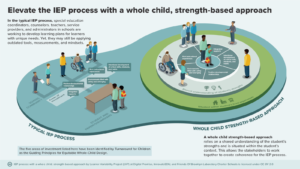Motivation May be More Important than Style
Jay Mathews dug up a report that suggested there was little evidence “to justify incorporating learning-styles assessments into general educational practice.” I think most teachers would agree that it’s obvious that kids learn in different ways. But it’s fair to say that books like multiple intelligences was taken to crazy and ineffective extremes.
Perhaps more important is the subject of motivation. High standards require hard work. Finding and nurturing the ‘hook’ that will improve persistence of struggling students may be even more important than ‘learning style.’ Attempts have included:
- Themes: thousands of high schools feature a career or interested-based theme in an attempt to provide integration, application, and motivation.
- Money: AP Strategies in Dallas and REACH pay students for passing Advanced Placement exams.
- Awards, competitions, and a variety of classroom bargains.
- Graduation (when it hadn’t seemed likely) or AA degree with diploma (e.g., Early College High Schools)
On the subject of motivation, I think game developers are a more sophisticated than we are as educators. We’ll learn a lot about motivation in the next few years as adaptive learning content matures.
It’s also worth noting that another personalization strategy–teaching at a students instructional level–is becoming easier and also improves motivation.
Learning platforms of the future will consider learning level, interests and motivational profile, as well as most productive learning modality (i.e., a more sophisticated view of learning style).








Rich
Interesting isn't it, that every successful video game involves some sort of competition. Whether it is beating an opponent or beating your own score, competition builds motivation. In the business consulting world where I have spent the last 20 years we know that what you measure increases. So how do we increase meaningful measurement and competition in the classroom?
Replies
Tom Vander Ark
Games and game strategies with reward mechanisms (eg, uBoost) will become much more pervasive. Content-embedded assessment will provide instant feedback to students (which beats the heck out of 'turn-it-in-get-score-next-week').
Also worth mentioning the importance of self-management. KIPP works hard on college-as-goal + work-hard-culture + self-management. Envictus supports Navigation 101, an online curriculum that promotes self management and links course selection/success with future life options.